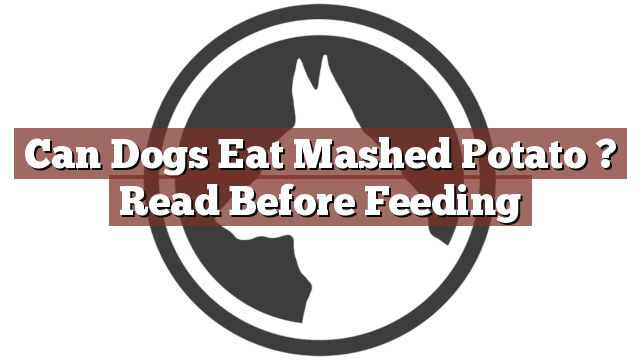Understanding Your Dog’s Dietary Needs
As a responsible pet owner, it is crucial to understand and meet your dog’s dietary needs. Dogs are primarily carnivorous animals, and their bodies are designed to digest and utilize animal-based proteins efficiently. However, dogs are also able to consume certain fruits, vegetables, and grains in moderation. While it may be tempting to share your plate of mashed potatoes with your furry friend, it is important to consider whether or not it is safe for them to eat.
Can Dogs Eat Mashed Potato? Read Before Feeding
Can dogs eat mashed potato? This is a common question among pet owners. The answer, unfortunately, is not as straightforward as a simple yes or no. While plain, boiled and mashed potatoes in small quantities are generally safe for dogs to consume, there are a few important factors to consider.
Potatoes themselves are not toxic to dogs, but the way they are prepared and seasoned can pose a problem. Mashed potatoes often contain ingredients like butter, milk, cheese, garlic, onion, or spices, which can be harmful or even toxic to dogs. These ingredients can lead to digestive upset, discomfort, or even more serious health issues such as anemia or damage to red blood cells. Additionally, the high carbohydrate content in mashed potatoes can lead to weight gain and other health problems if fed in excess.
Pros and Cons of Feeding Mashed Potato to Your Dog
Feeding mashed potato to your dog in moderation can have a few potential benefits. Potatoes are a good source of vitamin C, vitamin B6, and potassium, which can contribute to your dog’s overall health. They also provide some dietary fiber. However, it is important to weigh these potential benefits against the risks and drawbacks.
The cons of feeding mashed potato to your dog outweigh the pros. The aforementioned ingredients commonly found in mashed potatoes can be harmful or toxic to dogs. Additionally, the high carbohydrate content can lead to weight gain and other health issues, especially if your dog already has weight concerns. If you still choose to give mashed potatoes to your dog, make sure it is plain and free from any harmful ingredients or excessive seasoning.
Conclusion
Can dogs eat mashed potato? While it is generally best to avoid feeding mashed potatoes to your dog, plain, boiled and mashed potatoes in small quantities can be safe. However, it is important to be aware of potentially harmful ingredients and seasoning commonly added to mashed potatoes, as well as the high carbohydrate content. Before introducing any new food into your dog’s diet, it is recommended to consult with your veterinarian to ensure it is safe and appropriate for your pet. Remember, your dog’s health and well-being should always be the top priority.
Thank you for taking the time to read through our exploration of [page_title]. As every dog lover knows, our furry friends have unique dietary needs and responses, often varying from one canine to another. This is why it's paramount to approach any changes in their diet with caution and knowledge.
Before introducing any new treats or making alterations to your dog's diet based on our insights, it's crucial to consult with a veterinarian about [page_title]. Their expertise ensures that the choices you make are well-suited to your particular pet's health and well-being.
Even seemingly harmless foods can sometimes lead to allergic reactions or digestive issues, which is why monitoring your dog after introducing any new food item is essential.
The content provided here on [page_title] is crafted with care, thorough research, and a genuine love for dogs. Nevertheless, it serves as a general guideline and should not be considered a substitute for professional veterinary advice.
Always prioritize the expert insights of your veterinarian, and remember that the health and happiness of your furry companion come first.
May your journey with your pet continue to be filled with joy, love, and safe culinary adventures. Happy reading, and even happier snacking for your canine friend!

